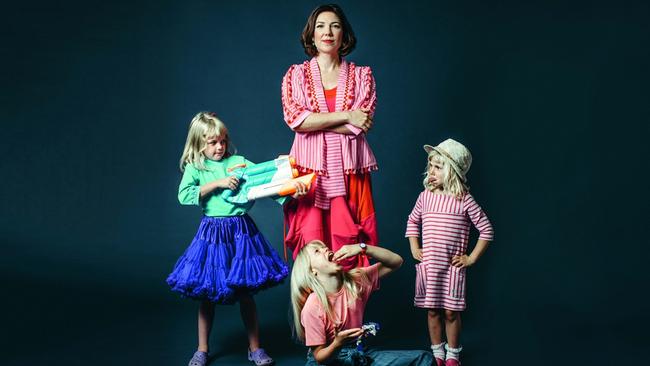Childcare, parenting and the secrets career women keep
A whole generation of women is being led to believe that parenting and having a career is doable when it patently is not.

My friend had called at 7.40am to say she couldn’t cope. “I got up at 3.30am, my mind was on fire, I couldn’t stop worrying, so I got out of bed and cleared my email backlog for the first time in months. Then the kids got up and I chased and shouted to get them ready and now I’m charging into a long day of meetings that run into each other and I feel like I never see my kids and I never get through the work and when I get home tonight my email will be full of more stuff I need to do. I’m at full capacity. Beyond full capacity. I can’t do anything more than I do. And yet people keep telling me I should do yoga. Of course I should bloody do yoga. But when? Oh God, when will this end, what do I do?” She had just dropped her kids at childcare and was walking (“Got to get some steps in”) to the station to get the train to her sales job in town.

If history is told by the winning men, I worry that the story of equality at work is too often being told by the winning women, the ones with the board seats and big pay packets, most notably Sheryl Sandberg, the chief operating officer of Facebook, whose 2013 book advised ambitious women to Lean In. Sometimes they have a nanny or an at-home husband. Either way, they are the exceptions. I remember reading an interview with British politician and sporting executive Karren Brady in which she said she split her time between her kids in the country and her job in town, and that it worked really well for her. Which I’m sure it did; it just didn’t much help me — or my friend in sales, who has a full-time working husband and is currently confronting the bitter reality that modern working life doesn’t combine well at all with having a family.
This mother doesn’t have her sights on a board-level job and is just working to pay the bills. She says her children are “the love and light” of her life and yet sometimes she feels they don’t even respond to her because she’s away from them too much and is ready to cry with tiredness when she finally gets home.
When I was working full-time with two small children, I too tried hard to make it work, but couldn’t. There were some memorable lows. Like a work trip to America when my breast pump broke and, after seeking help from the concierge, I had to take a taxi in the middle of the night to buy a new one, before spending the dawn hours crying and pumping milk down the drain of the hotel shower. Feeling desolate, I started to seek advice. I read a lot and went to talks and events about what women need to do to “get ahead”. High-profile female business leaders spoke at many of these. They inspired. But very often I found that the advice boiled down to “you have to work really hard, get great childcare and be super-well-organised”. This all made sense, but didn’t seem to help.
‘It’s a story being told by the winning women, the ones with the board seats and big pay packets’
Some of these superwomen talked about “flexibility”. It took me a while to realise that what they often meant was the flexibility to leave at the end of their contracted hours to pick up, feed and bathe their kids before working online again later to catch up. One mum-of-three, describing this in practical terms, told me: “I start eating my dinner and catching up on work at 10pm, just as everyone else is going to bed. It’s completely normal for me to finish at 1am or later.” The underlying message seemed to be that modern jobs are fine — as long as you’re willing to work all the waking and non-waking hours of the day.
Which means that it mostly doesn’t work well. Not only does it not work, it’s getting worse. Twenty years ago, the average working day was about seven hours and many mothers didn’t have a job outside the home. In the years since, the working day has grown by an average of about two hours and a million more mums have jobs. This is partly because house prices have soared in that time. Most households now need to have two parents out of the house working for long periods of the day. But, in that time, the needs of our children and the structure of childcare and the school day haven’t changed at all — as every parent of a school-age child discovers when there are weeks of the summer holidays still left to go, their own leave is used up, their finances are spent and the kids are going bananas with the need for involvement and undivided attention.
We’ve all got so used to accepting that it has to be this way that we keep at it. But my mum and my mother-in-law seemed so perplexed by my experience that I started to ask their friends and women of previous generations about their experiences, so I could shed some light on how we got here, trying to be superhuman and feeling like we’re failing ourselves and our kids.
I found that women in their 50s and 60s are often highly conscious of how working life has changed for the worse. There was a time, they explain, when you left work — probably frantic — at about 5pm and went home to your kids. But then came the laptops, mobiles and BlackBerrys that mean you still leave work frantic at about the same time, but then are expected to answer a call later or edit a document. Now, even when we are home, we aren’t really able to be present with our children and partners. Now, all over the country, we have parents wrestling their kids away from TVs and iPads to get them into bed without for one second letting go of their own mobile phones as they continue to field messages from work or dial into a conference call hoping no one can hear the kids splashing in the bath.

I realised we needed better answers to these questions one night when I met a friend in a pub. Between us, we had four children under three and two full-time jobs and, as the wine flowed, we let rip about how hopeless we were. Our lives were shit. She was leaving work by the fire escape in the desperate hope of seeing her kids awake once a day without annoying her colleagues. I was crying before work because I didn’t want to go in. We felt remote from our kids and our partners. We both wondered how we’d screwed up so badly and become such disasters. But then we began to question whether the world of work was set up for both parents to be in it full-time. Maybe there was a different story to tell where, however hard you work, there are very tough choices along the way and just being well organised doesn’t fix it.
Hungry for better advice, I set out to find it myself. I began to interview women, and some men, who were managing to combine work and family life to see what they had found out. We had great conversations. As the interviews went on, though, I was increasingly niggled by gaps in the stories I was telling. I would, for example, interview a wonderful, witty, smart woman and she would tell me about her family’s life. She would describe some manageable challenges and how she was tackling them. But then there were the things they told me but begged me not to write up, like the woman who’d put on a vast amount of weight after giving birth and suffered terrible depression but didn’t want her colleagues to know. Other times, I was asked to tone down a light joke about their partner not doing their fair share of the household jobs, or an admission that sometimes they ended up screaming blue murder at their kids, or maybe to take out one too many references to needing a few glasses (or bottles) of wine to get through the week.
I would still finish the interviews thinking we had got somewhere. But then a week, a month, six months later, I might run into some of these women and something more complex might emerge. Perhaps she was no longer with “the rock” partner who made it all work. Or her boss was a bully. Or her daughter was anorexic. Or her son was struggling at school. Maybe she’d been signed off work with stress or depression. Or she expressed regret at not being around enough during her children’s early years. Others said they didn’t have time for many friends.
A psychologist explained to me that the couples who have spent years being in control of their decisions — living in a nice place, choosing everything they do — can find the shift to parenting especially hard. A nanny told me the mums she worries most about are those desperate to keep up appearances. It matters to them that they drive a decent car and that the house looks neat. But they are, she says, often also the parents who come through the door glued to their phones and wave hello before hiding somewhere to work more.
The airbrushing hit me hardest when I was asked to interview a senior woman onstage at a corporate event so she could inspire her colleagues with her progression. I called her in advance and we had a brilliant chat about some difficult “time vampire” bosses she’d had when her children were young and how she had to change jobs to escape them. We talked about the battle to find the right nanny in the early years — and the total crisis when the nanny left. We talked about the pressure her job put on her relationship. So far, so familiar. But on stage, fearful of being judged by the audience for being a bad or lazy mum or too negative, she said none of this. She sat up straight, smiled and told me a completely different story. All her bosses had been on side. She’d never had a nanny, let alone one upon whom she wholly depended to keep the household working. Her husband was her biggest supporter. I left the stage furious with myself for not cutting through it.
‘Many women think that if they can’t make it work, then they’re not trying hard enough. Or they are not good enough’
I started to wonder why this clean-up routine was happening. She, like many others, didn’t want to conceal these things one-to-one; she wanted the catharsis of talking about it. But in public she feared everyone would judge her harshly if she was honest. As my articles about work/life were published, I could see the judgment pouring in and realised her instincts were right. In response to one piece I wrote about a high-powered woman with four children who said that the nanny cooked the family dinner, someone commented: “She might be powerful, but she is no mother.” Ouch.
The limits on these public conversations create a big problem. Because if the only people heard talking about what it takes for women to rise to the top at work are extremely senior, and they feel constrained from telling the truth about the hard bits, then we end up with an airbrushed public story that suggests you simply have to put in the effort. A whole generation is being led to believe that all this is doable when it patently is not. The really negative effect of these big little lies is that so many other women conclude that if they can’t make it work, then they’re not trying hard enough. Or they are not good enough.
I realised that to tell the full story of working parents I would have to talk to people without identifying them so they didn’t have to hide the truth. So there was a chance we could share stories — of the winners, losers and everyone muddling through in between — and, through that, get some proper answers that might help the rest of us. Take a woman I interviewed. We’ll call her Jane because she lives in fear of you or anyone else finding out who she is. She has three children and works in marketing. She is someone who, by her own admission, built her career over the 15 years before kids by being “always on”. She would have appeared to be successful in an interview in which she was named, even if she admitted some challenges. But there is no way she would have told the real story.
The truth is that after her kids arrived, she just ploughed on as she had before, typing busily with a tiny baby on her lap. Her boss, she admitted, was a “bitch with no personal life” who bombarded her with messages 24/7, even on holiday. Every day, she churned with restless anxiety and was racked with guilt that she dedicated only a quarter of her waking hours to her kids and husband and her own needs, the rest of it being gobbled up by work. She wouldn’t have revealed that she self-medicated with three glasses of wine a night. Or that she and her husband rarely connected aside from worrying about paying for the house and kids. Or that she was hopelessly unfit. She definitely wouldn’t have revealed that one of her children was so badly bullied at school that she stopped turning up or that, even though she was the mother, Jane didn’t know there was a problem until the school called her in for a crisis meeting.
Jane’s working practices — which are seen as pretty normal in her business — eventually drove her to anxiety attacks and stress leave. On the advice of her doctor, she used an Out of Office email message for the first time in her life and spent weeks watching TV and reading to recover. Gradually she started to get help and connect with other women in similar situations. Initially shy of sharing her experiences, she was amazed to find so many others who related to what had happened to her. Now things are different. Jane would have liked to change roles, but felt under pressure to keep her salary, so instead she changed teams and works from home some of the time.
She is now very engaged with her kids’ lives. She has taken up triathlons to get fit and protect herself from the constant invasion of work. She’s happier, though still working on building a better connection with her husband, and admits that she slips back into her old ways and has to reset. She says she’s mostly fine because she has stopped conforming to what her working world expects of people. But she also says she won’t get promoted now, because she isn’t 100 per cent responsive as she puts her family before work some of the time.
She is far from alone. Another mother I spoke to, a PA to a CEO, had downshifted to working three days a week after having kids, but was still drawn back into being online the rest of the time. The stress of trying to serve her boss led her to shout at her kids and lose control because she was distracted even when she wasn’t officially at work. This culminated in a trip to the park with her sons where one ran off and hid in a tree and one insisted on doing a poo in the bushes. She chased them home raging and, mortified by her own behaviour, locked herself in the bathroom crying before realising changes had to be made.
Or take the various parents who tell me that they have taken their kids to childcare or school knowing full well that they are ill. One child had a broken finger, another mother knew her son had chickenpox. But because their workplaces were so rigid, they would take the kids to school, depending on the staff to call them at work later to insist they collect them. Despite the possible distress to the children, the contagion, the wrath of the childcare centre or school and the double journey, this is still often seen as preferable to not turning up for work at all “because the kids are ill” — which in far too many workplaces is seen as a lame excuse that diminishes the person who uttered it.
There are so many other stories. The mum who threw up before her daughter’s birthday party because she works full-time and doesn’t know the other parents, who make her really nervous. The mum who works in a demanding job while her partner is mostly at home, but finds he doesn’t clean up or cook dinner or manage the homework, so when she gets home she often ends up crying at the burden of getting it all done and the injustice of being responsible for everything.
Then there’s the mum who leaves work totally exhausted on a Friday night, and on the way home sees all the other mums in a wine bar having fun and has the sickening realisation that she has no friends. Or the woman in finance whose husband hands her their baby as she staggers through the door at the end of the day, not appreciating her commute, her stressful job or the fact that she brings in the money. Or the woman who doesn’t want to work because she longs to be a “proper mum”, but can’t afford it and cries every day as she leaves her kids. Or the mum whose friends are based around work, and who spent her maternity leave pushing the pram around in the hope of just seeing people because she was so lonely; she went back to work so soon, she later regretted not spending more time bonding with her baby.
Then there’s the young mum raging at the logistical difficulty of getting her kid to and from school and working an eight-hour day, who asks me to whom she should complain to get this sorted, her rage triggered by the realisation that everyone with kids who works has to find a solution for this. And the mum of a boy with special needs, pushed out of her old job, who asks: “What kind of a job will let me take him to all the appointments he needs during the week?” And the mum who pulled a wriggling live nit out of her hair during a client presentation and squashed it before continuing.
These accounts are not unusual. Yet the true nitty-gritty horror of making it work rarely features in debates about the pay gap, the number of women who leave work after having kids and the lack of women at board and CEO level. We never get to hear the stories that make people feel less alone and realise that the failure isn’t their own. It also means we don’t share solutions that might actually help. Whether that is about being more conscious about the hours we work, changing our relationship with work, turning off our phones, taking control of our finances or rebalancing roles with our partner. If anything is to shift, we have to start telling the truth.
The Mother of All Jobs: How to Have Children and a Career and Stay Sane(ish) by Christine Armstrong (Bloomsbury) is out now
LET’S TALK ABOUT THE DADS
Time issues have an impact on both parents, but there is a big difference. Critically, men largely escape the judgment mums seem to face. Which is not to suggest that many men feel any different in terms of wanting to spend more time at home. Many would like to work more sensible hours and resent feeling diminished if they say so in their professional environment. They feel under pressure to “provide”: some relish this and some resent it. Some feel their partners have more choices because it’s more socially acceptable for them to ask for part-time or flexible work or to change careers. Others feel trapped by responsibility for the family income. The point is, men don’t feel like winners in this either; they are just a bit more likely to escape the stressful judgments women face.
Research by cognitive scientist Dr Barbara W. Sarnecka and her colleagues at the University of California, reported in The New York Times, found that subjects in a study were much less judgmental of fathers who left their children briefly (say, in a car) while they did a task: “A father who is distracted by his interests and obligations in the adult world is being, well, a father; a mother who does the same is failing her children”. Expectations of fathers remain far lower than those of mothers. Partly because of that lack of judgment they also express less guilt.
It may also be partly down to how the different genders tend to behave at work. Dr Bill Mitchell, a London psychologist who has treated workplace stress disorder for three decades, says: “I tend to avoid gender generalisations, but, increasingly, my clinical work makes the difference between the sexes more obvious. Women are hard-wired to belong, to take responsibility for others, and men are more able to be self-protective.” Which means, he says, that when an unexpected family problem arises, men are more inclined to dodge it.
Whatever the differences between genders, the consequences for our children remain the same. We don’t have enough time for them. Why does this matter and what do we do? It matters because we have a lot of working parents who are struggling and feeling like failures and not enjoying their kids. We see the rise in children’s mental health issues, and more than one psychologist has told me that they really worry about the kids of professional parents who are always distracted.
To address that, we need to be more honest so we can take more control of our own working experiences. We need to be able to talk more about what does work and how to make it work within our own families. For some, the price of “always on” will be worth it, because they are driven and ambitious and have the systems in place to make it work. For others, stepping back a bit at key points will make all the difference to them and their families.





To join the conversation, please log in. Don't have an account? Register
Join the conversation, you are commenting as Logout